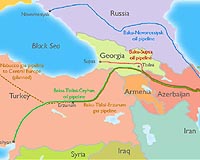 |
Ankara, Turkey (UPI) Aug 12, 2010 As Turkey imports nearly 90 percent of its energy requirements, it has sought reliable contracts with its neighbors to cover its needs. Turkey's agreements with its eastern neighbor Iran have increasingly unsettled those powers that seek sanctions on Tehran because of what many believe is a covert nuclear weapons program. Despite a recent round of U.S.-sponsored sanctions approved by the U.N. Security Council, Ankara has announced its intention to supply Iran with gasoline provided by Turkish companies, the Daily Times reported Thursday. The move is certain to cause friction with the United States but it is unclear if Washington will take action under either the new U.N. sanctions or under the terms of its Iran-Libya Sanctions Act, in force since August 1996, which seeks to impose mandatory and discretionary punitive measures on both U.S. and foreign companies that invest more than $20 million annually in Iran's oil and natural gas sectors. Turkish Energy Minister Taner Yildiz said" "If the preference of the private sector is to sell these (gasoline) products to Iran, we will help them. There is no demand for Turkey to halt the trade of these products with Iran." Despite Iran's massive oil reserves, the second-largest in the Organization of Petroleum Exporting Countries, a lack of refining capacity has forced the country to import gasoline, while sanctions have left the country's vast natural gas reserves, estimated to be the world's second largest after Russia, largely untapped. Iran provides nearly one-third of Turkey's domestic natural gas demand. Russia's Gazprom provides 63.7 percent of Turkey's imports, primarily via the Black Sea undersea Blue Stream pipeline, with the remainder coming from Azerbaijan. Much to Washington's annoyance, the same year that it implemented ILSA, Turkey signed a contract with Iran for natural gas deliveries, which began in December 2001 via a Tabriz-Ankara pipeline. In light of Anakra's efforts to diversify its import options, in 2006 the Baku-Tbilisi-Erzurum natural gas pipeline opened to carry Azeri Caspian natural gas to Turkey via Georgia. Not that Washington can claim it didn't see improved Turkish-Iranian energy ties coming -- after Iranian President Mahmoud Ahmadinejad made a visit to Turkey in August 2008, Turkish President Abdullah Gul said: "Expansion of relations on a regional level seems quite natural for Turkey and it is not important what other states think of it. "Turkey cares for its own interests. Turkey will establish good ties with its neighbors with an aim of stability and security in the region. We are an independent country. Here we eye our country's interests. ... We have to make investments for the (energy) supply security of Turkey." Turkish refiner Tupras began supplying gasoline to Iran in June, with the monthly total reaching 1.2 million barrels, accounting for one-third of Turkish exports to Iran that month. Turkey received $121.8 million, averaging out to $878 a ton, 25 percent more than the average Mediterranean spot price at the time.
Share This Article With Planet Earth
Related Links Powering The World in the 21st Century at Energy-Daily.com
 Turkish pipeline attacked
Turkish pipeline attackedAnkara, Turkey (UPI) Aug 11, 2010 Since the 1991 collapse of the Soviet Union, Turkey has made strenuous efforts to position itself as a regional energy hub. Its facilities have frequently been the targets of attacks, however. Two people died and one person was injured in a suspected terrorist attack about 6:30 p.m. Tuesday on the Kirkuk-Ceyhan pipeline in Turkey's Mardin region near the village of Midyat. The Ki ... read more |
|
| The content herein, unless otherwise known to be public domain, are Copyright 1995-2010 - SpaceDaily. AFP and UPI Wire Stories are copyright Agence France-Presse and United Press International. ESA Portal Reports are copyright European Space Agency. All NASA sourced material is public domain. Additional copyrights may apply in whole or part to other bona fide parties. Advertising does not imply endorsement,agreement or approval of any opinions, statements or information provided by SpaceDaily on any Web page published or hosted by SpaceDaily. Privacy Statement |